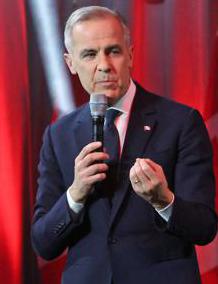OTTAWA — Amid a generational crisis in Canada’s relationship with the United States, the Liberal Party of Canada on Sunday chose an unelected technocrat with deep experience in financial markets to replace Justin Trudeau as party leader and the country’s prime minister, and to take on President Trump.
Mark Carney, 59, who steered the Bank of Canada through the 2008 global financial crisis and the Bank of England through Brexit, but who has never been elected to office, won a party leadership race on Sunday against his friend and former finance minister, Chrystia Freeland.
Carney won a stunning 85.9 percent of the votes cast by Liberal Party members. More than 150,000 people voted, according to the party’s leaders.
“America is not Canada. And Canada never, ever, will be part of America in any way, shape or form,’’ Carney said in his acceptance speech on Sunday evening to an electric crowd of party faithful, directly addressing Trump’s constant threat that he wants to make Canada the 51st state. “We didn’t ask for this fight, but Canadians are always ready when someone else drops the gloves.
“So Americans should make no mistake,’’ Carney added. “In trade, as in hockey, Canada will win.’’
He is expected to be sworn in as prime minister early this week, officially ending the Trudeau era. His first and most pressing challenge will be to manage the threat from Trump to Canada’s economy and sovereignty.
But, because Carney does not hold a seat in Parliament, he is expected to call federal elections soon after being sworn in as prime minister. In those elections, he will face off with Pierre Poilievre, the leader of the Conservative Party.
It’s a crucial moment to be taking the wheel in Canada, a member of NATO and the Group of 7 industrialized nations and the world’s second-largest country by land mass.
Trump has put his thumb on Canadian politics, through his on-again-off-again pursuit of tariffs against Canadian goods, which threaten to cripple the economy, and his menacing comments about annexation.
Trudeau summarized the mood within his own party, and much of Canadian society, speaking at the Liberal Party convention to an adoring crowd in Ottawa, the capital, before his successor was announced.
“This is a nation-defining moment. Democracy is not a given. Freedom is not a given,’’ Trudeau said. “Even Canada is not a given.’’
Carney said he supported the retaliatory tariffs Canada has adopted. “My government will keep our tariffs on until the Americans show us respect,’’ he said.
Canadian voters have suggested to opinion researchers that who might best stand up to Trump has been a key question guiding the choice of Carney and future decisions in the federal election.
Federal elections must be held by October in line with Canada’s rules. The Conservative Party, led by Poilievre, had long maintained a 20-plus point lead over the Liberals in polls, but the gap has been closing since Trudeau announced his resignation and Trump started making moves against Canada.
The latest polling suggests that most respondents would choose Carney over Poilievre if he led the Liberal Party into the elections. Polling also shows that Canadians would prefer Carney to negotiate with Trump over Poilievre. Poilievre has suffered a serious setback in polls, as some voters see him as too close ideologically to Trump.
And on Sunday night, Carney quickly pivoted to federal election campaign rhetoric to attack Poilievre, casting him as devoid of real-world experience and too admiring of Trump to challenge him.
“Donald Trump thinks he can weaken us with his plan to divide and conquer. Pierre Poilievre’s plan will leave us divided and ready to be conquered,’’ he said. “Because a person who worships at the altar of Donald Trump will kneel before him, not stand up to him.’’
Carney’s experience in handling major crises as a technocrat could also give him an advantage over Poilievre in people’s perceptions. Poilievre, 45, has been a lifelong politician without much experience outside Canada’s parliamentary rough and tumble.
A key question will be whether Carney can sufficiently differentiate himself from Trudeau, whom he advised and was friendly with. Canadians say they want change after a decade of Trudeau.
In his acceptance speech, Carney sought to brandish his Liberal credentials.
“I know that markets don’t have values, people do,’’ he said. “When markets are governed well, they deliver great jobs and strong growth better than anything. But markets are also indifferent to human suffering and are blind to our greatest needs,’’ he added.
